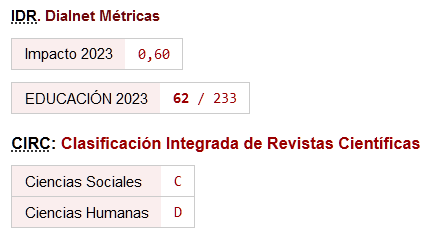Efectos diferenciales del estado socioeconómico y el entorno familiar de los adolescentes sobre su inteligencia emocional, estrés académico y logro académico
DOI:
https://doi.org/10.46661/ijeri.5148Palabras clave:
Estado socioeconómico, entorno familiar, rendimiento académico, estrés académico, inteligencia emocionalResumen
En este trabajo, el investigador ha presentado los resultados de un estudio realizado para determinar si los adolescentes que pertenecen a diferentes niveles de situación socioeconómica y entorno familiar difieren en su inteligencia emocional, estrés académico y rendimiento académico. El estudio se realizó en una muestra de 858 adolescentes que estudian en varias escuelas secundarias del distrito de Aligarh en el estado de Uttar Pradesh, India. Se emplearon escalas estandarizadas para la recolección de datos. Se aplicó la técnica de Análisis de varianza múltiple (MANOVA) para observar el efecto. La homogeneidad de las matrices de covarianza se verificó utilizando el valor M de Box. Los resultados revelaron que el estado socioeconómico (SES) y el entorno familiar tienen un efecto significativo en todas las variables mencionadas. Los resultados del análisis post hoc (Prueba Tukey HSD) revelaron que existen diferencias con respecto a la Inteligencia Emocional, el Estrés Académico y el Logro Académico entre los grupos de adolescentes con diferentes niveles de Estado Socioeconómico y Ambiente Familiar
Descargas
Citas
Abdu-Raheem, B.O. (2015). Parents’ socio-economic status as predictor of secondary school students’ academic performance in Ekiti State, Nigeria. Journal of Education and Practice, 6(1), 123-128.
Akram, M., Khan, I., & Baby, S. (2013). Manual of academic stress questionnaire. New Delhi: Prasad Psychological Corporation.
Bar-On, R. (1997). Bar-On emotional quotient inventory (EQ-I): Technical manual. Toronto, Canada: Multi-Health Systems.
Benner, A. D., Boyle, A. E., & Sadler, S. (2016). Parental involvement and adolescents’ educational success: the roles of prior achievement and socioeconomic status. Journal of Youth and Adolescence. 45, 1053–1064.
https://doi.org/10.1007/s10964-016-0431-4
Berkowitz, R. et al.(2017). A Research Synthesis of the Associations Between Socioeconomic Background, Inequality, School Climate, and Academic Achievement. Review of Educational Research. 87(2), 425-469. https://doi.org/10.3102/0034654316669821
Bhatia,H & Chaddha,N.K. (2010). Manual of family environment scale. Agra: National Psychological Corporation.
Borah, S (2013). Family environment and academic achievement of adolescent students of Jorhat district, Assam. Indian Journal of Education Research Experimentation and Innovation, 3 (3).
Bulmer, M. G. (1979). Principles of Statistics (Dover). New York: Dover.
Chand, P., & Sharma, H. (2012). Factors affecting academic performance of senior secondary science students: An exploratory study in Himachal Pradesh. Online International Interdisciplinary Research Journal, 2(6), 211-220. http://www.oiirj.org/oiirj/nov-dec2012/27.pdf
Chapin, F. S. (1928). A quantitative scale for rating the home and social environment of middle class families in an urban community: a first approximation to the measurement of socio-economic status. Journal of Educational Psychology,19(2),99-111. http://dx.doi.org/10.1037/h0074500
Conger, R. D., Conger, K. J., & Elder, G. H., Jr. (1997). Family economic hardship and adolescent adjustment: Mediating and moderating processes. In G. J. Duncan & J.Brooks-Gunn (Eds.), Consequences of growing up poor (pp. 288-310). New York: Russell Sage Foundation.
Conger, R. D., Conger, K. J., Elder, G. H., Lorenz, F., Simons, R., & Whitbeck, L. (1992). A family process model of economic hardship and adjustment in early adolescent boys. Child Development, 63, 526-541.
Dahie, A.M., Mohamed, M.O. & Moalim, A. A. (2016). Socio-economic status and academic achievement at secondary schools in Mogadishu- Somalia. International Journal in Management and Social Science, 4(1) 301- 313. http://www.ijmr.net.in
Daulta, M.S.N. (2008). Impact of home environment on the scholastic achievement of children . Journal of Human Ecology, 23(1), 75-77.
de Anda D, Baroni S, Boskin L, Buchwald L, Morgan J, Ow J, Gold J.S., & Weiss R.(2000). Stress, stressors and coping among high school students. Children and Youth Services Review, 22(6), 441-463. https://doi.org/10.1016/S0190-7409(00)00096-7
Deb, S., Strodl, E., & Sun, J. (2015). Academic stress, parental pressure, anxiety and mental health among Indian high school students. International Journal of Psychology and Behavioral Sciences, 5(1), 26-34.
Deswal,Y.S., Rani, R & Ahlawat,S. (2014). Impact of home environment on academic achievement of adolescent students in relation to their locality and type of school. Bharatiyam International Journal of Education and Research,3 (3),42-49.
Diaz, A.L. (2003). Personal, family and academic factors affecting low achievement in secondary school. Electronic Journal of Research in Educational Psychology and Psychopedagogy, 1(1), 43-66.
Duncan, G. J., & Magnuson, K. A. (2003). Off with Holhngshead: Socioeconomic resources, parenting, and child development. In M. H. Bornstein & R. H. Bradley (Eds.). Socio-economic Status, parenting, and child development, 83-106. Mahwah, NJ: Lawrence Erlbaum Publishers.
Duncan, G.J., & Brooks-Gunn, J. (1997). Consequences of growing up poor. New York: Russell Sage Foundation Press.
Ewumi, A.M. (2014).Gender and socio-economic status as correlates of students’ academic achievement in senior secondary schools. European Scientific Journal, 8(4), 23-36.
https://pdfs.semanticscholar.org/c2bd/0f1336218a774f92575ca3f240d89c072d7e.pdf
Finkelstein D.M. et al.( 2007) Socioeconomic differences in adolescent stress: the role of psychological resources. Journal of Adolescent Health. 40 (2), 127–134.
Firman, R. A. (1992). Helping children cope with stress and heal with feeling of young children. New York: International Universities Press.
Goleman, D. (1995). Emotional Intelligence: Why it can matter more than IQ. New York: Bantam Books.
Goodman, E et al. (2005). Social disadvantage and adolescent stress. Journal of Adolescent Health, 37(6),484-92.
Jamadar, C., & Sindhu A. (2015). The impact of socio economic status on emotional intelligence and creativity among tribal adolescent students. The International Journal of Indian Psychology 3(1), 112-125.
https://www.researchgate.net/publication/282281487_The_Impact_of_Socio_Economic_Status_on_Emotional_Intelligence_and Creativity_among_Tribal_Adolescent_Students
Kadapatti, M., & Khadi, P.B.S(2006), Factors influencing for academic stress among pre-university students. Indian Psychological Review, 66(2), 83-88.
Kalia, A.K., & Sahu, S. (2012). Manual of socioeconomic status scale. Agra: National Psychological Corporation.
Khan, M.A., & Dar, I. A.(2013). Emotional Intelligence of adolescent students with special reference to high and low socio economic status. Nature and Science.11(3). 114-119 https://www.researchgate.net/publication/326579516_Emotional_Intelligence_Of_Adolescent_Students_With_Special_Reference_To_High_And_Low_Socio_Economic_Status
Karla, R & Pyari, A.(2004). Family climate and income as determinants of educational achievement. Behavioural Scientists, 5(1), 55-57.
Khan, S.A., & Khan, F.A.(2013). To study the relationship of academic stress and socio-economic status among IX standard students of Raipur City. Journal on Educational Psychology, 7 (1), 34-42. https://files.eric.ed.gov/fulltext/EJ1101775.pdf
Kulshreshta, R. N. (1979). A study of vocational interests, occupational choices, Socio-economic status and intelligence of class 11th students. Indian Educational Review, 3(4), 10-16.
Kumar, R (2018). Academic stress, family environment and music at adolescent stage Journal of Advances and Scholarly Researches in Allied Education , 15(8),47-52. http://ignited.in/p/57866
Lent, R. W, Brown S.D., & Hackett G.(2000). Contextual supports and barriers to career choice: a social cognitive analysis. Journal of Counseling Psychology, 47, 36–49.
Li, S., Xu.Q. & Xia,R.(2020). Relationship between ses and academic achievement of junior high school students in China: the mediating effect of self-concept. Frontiers in Psychology ,10:2513. doi: 10.3389/fpsyg.2019.02513
Liu,F. (2017). Academic stress and mental health among adolescents in Shenzhen, China. Published Thesis. School of Psychology and Counselling and School of Public Health and Social Work. Queensland University of Technology. https://eprints.qut.edu.au/107980/1/Fan_Liu_Thesis.pdf
Liu, J., Peng, P. & Luo, L. (2020). The relation between family socioeconomic status and academic achievement in China: a meta-analysis. Educational Psychological Review, 32, 49–76. https://doi.org/10.1007/s10648-019-09494-0
Mangal, S. K., & Mangal, S. (2012). Manual of emotional intelligence inventory. Agra: National Psychological Corporation.
Mayer, J., & Salovey,P(1990).Emotional intelligence. Imagination, cognition and personality , 9(3), 185-211.
Mishra (1986). In Kusum, A. (2005). Creativity and cognitive styles in children. Delhi: Arora Press.
Moos, R.H., & Moos, B.S.(1994). Family environment scale. (manual). (3rd ed). Palo Alto (CA): Consulting Psychologists Press.
Murberg, T. A., & Bru, E. (2004). School related stress and psychosomatic symptoms among Norwegian adolescents. School Psychology International, 25, 317-332. http://dx.doi.org/10.1177/0143034304046904
Nadaf,Z.A.(2019). A study on emotional intelligence, academic achievement, socio-economic status and locale among secondary school students. International Journal of Advance and Innovative Research, 6(1), 6-11.
Naghavi, F., & Redzuan, M. (2012). Relationship between family environment and emotional intelligence: examination of the moderating factor. Life Science Journal, 9(1),764-770.
http://www.lifesciencesite.com/lsj/life0901/110_8321life0901_764_770.pdf
Ngussa, B.M.( 2019). Academic achievement : a case of community secondary schools in Monduli district in Tanzania.World Journal of Educational Research,6(3), 354-366.
Olpin, M. N. (1996) Perceived stress levels and sources of stress among college students: Methods, frequency, and effectiveness of managing stress by college students. (Dissertation). Carbondale: Southern Illinois University. http://faculty.weber.edu/molpin/dissertation.html
Pallant, J. (2001). SPSS survival manual: A step by step guide to data analysis using SPSS. Buckingham: Open University Press.
Parveen, A. (2007). Effect of home environment on personality and academic achievement of students of grade 12 in Rawalpindi division. (Ph.D. Thesis), National University of modern languages, Islamabad.
Peng, S., & Wright, D. (1994). Explanation of academic achievement of Asian American students. The Journal of Educational Research, 87(6), 346-352. www.jstor.org/stable/27541942
Poornima, D. (2014). A study of academic achievement of 10+1 students in relation to their metacognition, self-confidence and family environment.(Ph.D Thesis), Maharshi Dayanand University. https://shodhganga.inflibnet.ac.in/handle/10603/39123
Pressey, S.L., Robbinson, F. & Horracks, J.E. (1959) .Psychology of Education. New York: Harper and Brother.
Rais, S. (2011). Impacto of family climate and parental encouragement on academic achievement among adolescents (14-17 years). (Ph.D Thesis), Aligarh: A.M.U. http://shodhganga.inflibnet.ac.in/bitstream /10603/11223/12/12_chapter%205.pdf
Rao, A. S. (2008). Academic stress and adolescent distress: the experiences of 12th standard students in Chennai, India (Ph.D. dissertation, Graduate College, University of Arizona).
http://arizona.openrepository.eom/arizona/bitstream/10150/194424/1/azuetd2943_sipl_m.pdf
Rathee, N & Sharma,S (2018). Alienation and socio-economic status as correlates of academic stress among high school students. International Journal of Research and Analytical Reviews,5(4),356-360. http://ijrar.com/upload_issue/ijrar_issue_20542565.pdf
Robert,J.S., & Kadhiravan,S.(2019). Influence of family environment on emotional intelligence among youth. International Journal Of Scientific & Technology Research.8(11),3664-3670. http://www.ijstr.org/final-print/nov2019/Influence-Of-Family-Environment-On-Emotional-Intelligence-Among-Youth.pdf
Shah, M., Atta, A., Qureshi, M.I., & Shah, H. (2012). Impact of socio-economic status (ses) of family on the academic achievements of students. Gomal University Journal of Research, 28(1), 12-17.
Shaheen, F., & Gul, F. (2014). Socioeconomic status and achievement: a survey study of students at secondary level. International Journal of Educational Studies, 1 (03), 163-167.
Singh, S. (2013). A study on impact of family environment on academic achievement of secondary school science students. International Journal of Basic and Advanced Research, 2(6), 139-142.
Soharwardi, M. A., Fatima, A., Nazir, R., Firdous,A. (2020). Impact of parental socioeconomic status on academic performance of students: a case study of Bahawalpur, Pakistan. Journal of Economics and Economic Education Research, 21(2),1-8 https://www.abacademies.org/articles/Impact-of-parental-socioeconomic-status-on-academic-performance-of-students-1533-3604-21-2-176.pdf
Sonali, S. (2016a). Impact of academic stress among adolescents in relation to gender, class and type of school organization . International Journal of Applied Research 2 (8), 317-322.
Sonali, S (2016b). Role of socio-economic status in academic stress of senior secondary students. International Journal of Advanced Education and Research, 1(12), 44-50. https://www.alleducationjournal.com/
Steinberger, E.D. (1993). Improving student achievement. Virginia: American Association of School Administrators.
Suleman, Q., Hussain,I., Khan, F.U., & Zaib-un-nisa. (2012). Effects of parental socioeconomic status on the academic achievement of secondary school students in Karak District, Pakistan. International Journal of Human Resource Studies, 2(4), 14-32. http://dx.doi.org/10.5296/ijhrs.v2i4.2511
Szocs, L.A. (2013). The effects of the socioeconomic status on the academic achievement. (Ph D Thesis Abstract), Babeş- Bolyai University
Uzzaman,M.A., & Karim, A.K.M.R. (2018). Family and school environment in relation to adolescents emotional intelligence and future aspiration. Indian Journal of Positive Psychology, 9(3), 413-422.
Vyas, S., & Choudhary, G. (2017). Relationship of socio economic status with frustration, self-concept, study habits and academic achievement of adolescents. International Journal of Advanced Research and Development, 2(3), 46-51.
Wilbum, V. R., & Smith, D. E. (2005). Stress, self-esteem, and suicidal ideation in late adolescents. Adolescence, 40(157), 33-45.
Wilks, S. E. (2008). Resilience and academic stress: the moderating impact of social support among social work students. Advances in Social Work, 9 (2), 106-125.
Yazici, H., Seyis, S., & Altun, F. (2011). Emotional intelligence and self-efficacy beliefs as predictors of academic achievement among high school students. Procedia-Social and Behavioral Sciences, 15, 2319-2323.
Yinusa, M.A., & Basil, A.O. (2008). Socio-economic factors influencing students academic performance in Nigeria: Some explanation from a local survey. Pakistan Journal of Social Sciences, 5(4), 319-323. http://docsdrive.com/pdfs/medwelljournals/pjssci/2008/319-323.pdf
Yunus,S.A., Baba S.L., & Wai,P.S.(2014).Effect of family environment on student academic performance and adjustment problems in school .Journal of Education and Practice, 5 (19).96-100.
Descargas
Publicado
Cómo citar
Número
Sección
Licencia
Derechos de autor 2022 RAZIA B Naushad

Esta obra está bajo una licencia internacional Creative Commons Atribución-NoComercial-SinDerivadas 4.0.











